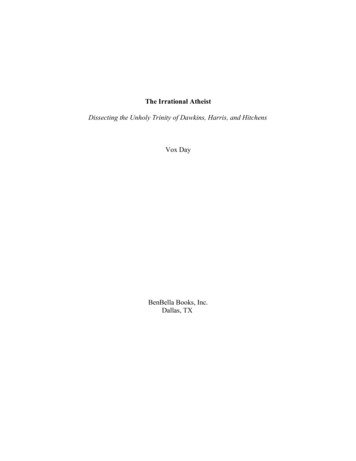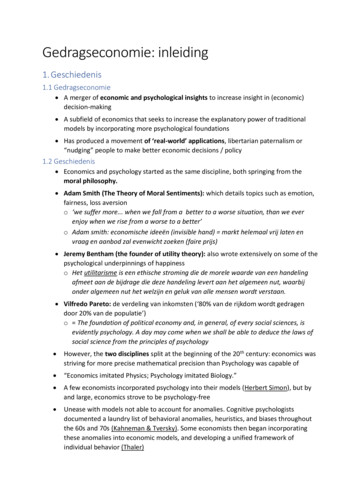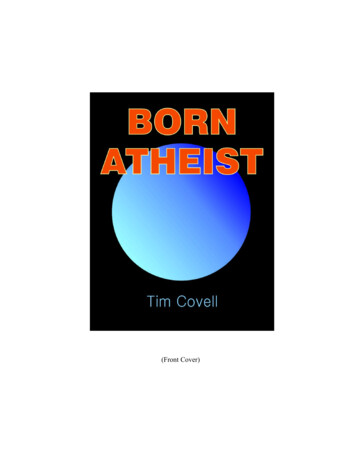
Transcription
The Irrational AtheistDissecting the Unholy Trinity of Dawkins, Harris, and HitchensVox DayBenBella Books, Inc.Dallas, TX
Copyright 2007 by Vox DayAll rights reserved. No part of this book may be used or reproduced in any manner whatsoever withoutwritten permission except in the case of brief quotations embodied in critical articles or reviews.BenBella Books, Inc.6440 N. Central Expressway, Suite 503Dallas, TX 75206Send feedback to nted in the United States of America10 9 8 7 6 5 4 3 2Ebook version 1.3 (2/7/2008)Library of Congress Cataloging-in-Publication Data[CIP DATA]Proofreading by Maggie McGuire, Emily Chauviere, and Yara AbuataCover design by Todd Michael BushmanDesign and composition by John Reinhardt Book DesignPrinted by Bang PrintingDistributed by Independent Publishers GroupTo order call (800) 888-4741www.ipgbook.comFor special sales, contact Robyn White at Robyn@benbellabooks.com
TABLE OF CONTENTSPrefaceChapter IA PRIDE OF ATHEISTSChapter IIDEFINING SCIENCEChapter IIITHE CASE AGAINST SCIENCEChapter IVTHE RELIGION OF REASONChapter VSAM TZU AND THE ART OF WARChapter VITHE WAR DELUSIONChapter VIITHE END OF SAM HARRISChapter VIIIDARWIN’S JUDASChapter IXA MARXIAN APOSTATEChapter XTHE PRAGMATIC PHILOSOPHERChapter XITHE ROBESPIERRE OF ATHEISMChapter XIIHITLER, THE INQUISITION, THE CRUSADES, AND HUMAN SACRIFICEChapter XIIITHE RED HAND OF ATHEISMChapter IVOCCAM’S CHAINSAWChapter XVMASTER OF PUPPETS OR GAME DESIGNER?Chapter XVI“I BELONG TO JESUS”Appendix AAppendix BBibliographyNOTE: THIS IS AN ABRIDGED VERSION OF THE IRRATIONAL ATHEIST. THECOMPLETE E-TEXT CAN BE PURCHASED FOR 1.99 AT AMAZON.COM AND OTHERLOCATIONS.
PREFACEGet ready for the throw down. . . .—TUPAC SHAKUR, 2 Of Amerikaz Most Wanted“What’s your obsession with these guys?” a reader e-mailed to ask after my fourth column addressingthe intellectual sins of the three leading New Atheists was published on WorldNetDaily, theindependent news site where I write a weekly opinion column. After all, the Creator God of theUniverse is presumably capable of defending himself, and the elephant is what it is, regardless of whatI, Richard Dawkins, Sam Harris, Christopher Hitchens, or anyone else might imagine it to be basedupon our different experiences of it.When it comes to understanding God, are we not all blind men feeling up an oversizedmammal?And while I am a believer, a non-denominational evangelical Christian to be precise, mypurpose in writing this book is not to defend God, or even to argue for the truth of my particularreligious faith. Instead, I intend to defend those who are now being misled into doubting their faith orbeing misguided into feeling more secure in their lack of faith on the basis of the fraudulent, error-filledwritings of these three men. I do not make this triple charge of fraudulence lightly, nor is my doing so afearful response to their churlish disregard for what to me and millions of other individuals is thecentral element of human existence.There is simply no more fitting description of the cerebral snake oil that Dawkins, Harris, andHitchens are huckstering to the unwary reader—and the media—under the false label of science andreason. I am confident that no one, not even the most purely rational, über-skeptical agnostic or cardcarrying ACLU atheist, will take serious exception to my charge by the time they finish this book.It took me some time to decide what this book should be titled. Part of the challenge was due tothe fact that it addresses the philosophical and ideological arguments of three very different men. If the
book were to solely address Sam Harris, I should likely have entitled it The Incompetent Atheist. In thecase of Christopher Hitchens, I could have reasonably named it The Irrelevant Atheist. And given theway in which the eminent Richard Dawkins has apparently decided to abandon empirical evidence, thescientific method and Reason herself in embracing a quasi-medieval philosophical ontology, TheIronic Atheist would surely have been most fitting.In the end, I settled upon The Irrational Atheist for the following reason. This book is a directchallenge to the idea that atheism is the proper philosophical standard for human reason, that being anatheist is an inherently rational perspective, and that religion has no place in a rational, civilizedsociety.This is not a theological work. The text contains no arguments for the existence of God and thesupernatural, nor is it concerned with evolution, creationism, the age of Earth, or intelligent design. Itcontains no arguments from Scripture; in attacking the arguments, assertions, and conclusions of theNew Atheists, my only weapons are the purely secular ones of reason, logic, and historicallydocumented, independently verifiable fact. This is not a book about God, it is about those who seek toreplace Him.At first glance, it may seem crazy that a computer game designer, one whose only significantintellectual accomplishment of note is to have once convinced Michelle Malkin to skip an opportunityto promote herself, should dare to dispute an Oxford don, a respected university professor, a famousFrench philosopher, a highly regarded journalist, and an ecstasy-using dropout who is still workingtowards a graduate degree at forty . . . okay, perhaps that last one makes sense. As Gag Halfrunt isreliably reported to have said of the immortal Zaphod Beeblebrox, I’m just zis guy, ya know?But don’t be tempted by the logical fallacy of the Appeal To Authority; after all, in this age ofacademic specialization, an evolutionary biologist is less likely to be an expert on the historical causesof war and religious conflict than the average twelve-year-old wargamer, and even a professor in thefield of cognitive studies may not have spent as much time contemplating the deeper mysteries of
intelligence as a game designer who has seen many a sunrise while experimenting with the best way tomake the monsters smarter.So, I should like to encourage you to think of this book as an intellectual deathmatch, keep trackof the frags, and see if I don’t manage to exorcise the unholy trinity of Richard Dawkins, Sam Harris,and Christopher Hitchens once and for all.
Chapter IA PRIDE OF ATHIESTS“Vox Dei, as every philosopher knows, cannot be trusted in science.”—CHARLES DARWIN, “Organs of Extreme Perfection and Complication”I don’t care if you go to Hell.God does, assuming He exists, or He wouldn’t have bothered sending His Son to save you fromit. Jesus Christ does too, if you’ll accept for the sake of argument that he went to all the trouble ofincarnating as a man, dying on the cross, and being resurrected from the dead in order to hand you aGet Out of Hell Free card.Me, not so much. I don’t know you. I don’t owe you anything. While as a Christian I am calledto share the Good News with you, I can’t force you to accept it. Horse, water, drink, and all that.So, it’s all on you. Your soul is not my responsibility.I am a Christian. I’m also a libertarian. I believe in free will and in allowing you to exercise it. Ibelieve that our free will is a gift from our Creator and that He expects us to use it. I believe in livingand letting live. If you’ll leave me alone, I’ll be delighted to do you the courtesy of leaving you alone inreturn. I have no inherent problem with atheists or agnostics, I have no problem with Muslims or Jewsor Hindus or Pastafarians, and I have no problem with the crazies who believe that humanity is theresult of ancient alien breeding experiments. To be honest, I rather like the crazies, their theories areusually the most entertaining of the lot. I believe what I believe, you believe what you believe, andthere’s no reason why we shouldn’t both be perfectly cool with that.Richard Dawkins, Sam Harris, and Christopher Hitchens are not so much cool with that.I’m not asking you to respect my beliefs. Why should you? Maybe you think I’m insanebecause I believe that Jesus is coming back one of these days, but does my insanity actually affect you
in any material way? Is my religious madness really all that much more out there than my faith that theMinnesota Vikings will win the Super Bowl someday? Talk about the substance of things hoped for . . .Vegas will give you better odds on J.C. this year. As for your beliefs, I really don’t care if you want toquestion God’s existence or criticize the Pope or deny the Holocaust or declare that Jesus was anarchitect previous to his career as a prophet. Every member of humanity is at least a little bit crazy inhis own special way, some of us just happen to make it a little more obvious than others.Vox’s First Law: Any sufficiently advanced intelligence is indistinguishable from insanity.All I ask, all the vast majority of the billions of people of faith on the planet ask, is to be leftalone to believe what we choose to believe and live how we decide to live. But the Unholy Trinity haveno intention of leaving me alone. Richard Dawkins accuses me of child abuse because I teach mychildren that God loves them even more than I do. Sam Harris declares that I should not be toleratedand suggests that it might be ethical to kill me in preemptive self-defense. Christopher Hitchens assertsthat I am a form of human Drāno, poisoning everything I encounter. A fourth New Atheist, thephilosopher Daniel C. Dennett, is less judgmental, but even he, bless his heart, wants to save me frommyself.And now we have a problem.That's why I'm writing this book. I’m not trying to convince you that God exists. I’m not tryingto convince you to accept Jesus Christ as your Lord and Savior. I’m not even trying to convince youthat religious people aren’t lunatics with low IQs who should be regarded with pity and contempt. But Iam confident that I will convince you that this trio of New Atheists, this Unholy Trinity, is a collectionof faux-intellectual frauds utilizing pseudo-scientific sleight of hand in order to falsely claim thatreligious faith is inherently dangerous and has no place in the modern world.I am saying that they are wrong, they are reliably, verifiably, and factually incorrect. RichardDawkins is wrong. Daniel C. Dennett is wrong. Christopher Hitchens is drunk, and he’s wrong. MichelOnfray is French, and he’s wrong. Sam Harris is so superlatively wrong that it will require the
development of esoteric mathematics operating simultaneously in multiple dimensions to fullycomprehend the orders of magnitude of his wrongness.You make the call.THE CHURCHES OF ATHEISMThe idea that he is a devotee of reason seeing through the outdated superstitions believed by lessintelligent beings is the foremost conceit of the atheist. This heady notion was first made popular byFrench intellectuals and deistic ur-atheists such as Voltaire and Dennis Diderot, who ushered in the socalled Age of Enlightenment. That they also paved the way for the murderous excesses of the FrenchRevolution and dozens of other massacres in the name of human progress is usually considered anunfortunate coincidence by their philosophical descendants.Atheism is not new. It predates Christianity by at least 400 years according to the account of thetrial of Socrates recorded by Plato in his Apology back in 399 B.C.1 While the Athenian philosopherdenied the charge of disrespecting the gods of Olympus, the fact that both Socrates and his accuserMeletus recognized the concept of atheos and argued over whether it was an accurate description ofSocrates’s beliefs or not is sufficient proof that there were those who did not believe in divine beingslong before Richard Dawkins left the lab at Oxford and took up his cross to follow Darwin.In his review of the history of atheism, French atheologist Michel Onfray dates its explicitinception to 1729 and a book published posthumously by the Abbè Jean Meslier, the parish priest ofEtrépigny in northeastern France.2 His Memoir of the Thoughts and Feelings of Jean Meslier: Clearand Evident Demonstrations of the Vanity and Falsity of All the Religions of the World is lessinteresting for its historical noteworthiness than for the way it shows how little atheism has changedover the last 278 years. Meslier is perpetually indignant, he denies miracles, free will, and the soul,asserts the superiority of atheist morality and looks forward to the “happy and great revolution” to12Spare me that B.C.E. BS. You would think historians, of all people, would have some respect for historical tradition.Onfray, Michel. In Defence of Atheism: The Case Against Christianity, Judaism and Islam. London: , 2007. 29.
come when reason replaces religion. According to Onfray, he even calls for an “internationalcommunalism.” It’s really quite extraordinary.Still, one may be excused for not being aware of atheism’s historic intellectual lineage,considering the copious media coverage that has been devoted to the discovery of the three men WiredMagazine breathlessly dubbed “the New Atheists,” Richard Dawkins, Sam Harris, and Daniel Dennett.With the recent addition of Christopher Hitchens, the New Atheists are nearly as inescapable these daysas they are incestuous;3 here Dawkins is lionizing Harris’s “wonderful little book,” there he is favorablyquoting Dennett favorably quoting himself, while the works of Dawkins and Dennett top Harris’s list ofrecommended reading. Only Hitchens, ever the iconoclast, doesn’t join the endless circle jerk, keepinghis references to the others at a minimum and showing the good sense to be embarrassed by the twoprofessors’ insistence on calling themselves “brights.”These days atheism is, like the atheist’s ultimate destination, hot indeed. Not since the 1920s,when the faux scientific writings of Freud and Marx were inspiring European intellectuals and artists,and the latter part of the 1960s when the American intellectual elite belatedly caught up, has there beenso much enthusiasm about the non-existence of God. This is somewhat bewildering, as no one appearsto be nearly as excited about a similar absence of belief in unicorns, vampires, werewolves, astrology,nation-building, or the Labor Theory of Value. Nor is anyone dedicating much of their time to writingbooks and giving speeches at universities and conferences with the avowed goal of convincing othersnot to believe in them either. On the other hand, unicorn fanciers don’t possess a great deal of influencewith either of the two American political parties, vampire enthusiasts don’t commit honor killings,4 andastrologers are seldom known to launch global holy wars based on the relative positions of Mars andVenus.3Dawkins, Richard. The God Delusion London: Houghton Mifflin, 2006. In a book largely dedicated to attackingChristianity and the Bible, Richard Dawkins refers to the Books of Matthew, Mark, Luke, and John a total of twelvetimes. He cites Mr. Harris and Professor Dennett twenty-two times, only twenty times more than the influential Christianintellectuals G.K. Chesterton and C.S. Lewis.4They do, however, commit rather more murders than one might suspect. And rather nasty ones too.
So perhaps it’s not entirely unreasonable that those concerned with the collective clout of thebillions of individuals who believe in the spiritual sovereignty of a formerly deceased Jewish carpentershould seek to reduce that influence by undermining those beliefs. It is certainly in keeping with thebest practices of Western intellectual debate; Adam Smith similarly attacked the French physiocrats bypointing out the divergence between their theoretical system and the way in which the various nationaleconomies had been observed to operate.5However, it is not only nature that abhors a vacuum. The human intellect is not well-suited tostop believing in one thing without replacing that belief, nor is it comfortable for an individual to drophis self-identification without selecting an alternate. While the New Atheists express some faint hopeof converting the religious faithful into disbelievers, this is not the primary focus of their works.Dawkins and Dennett both express a degree of skepticism that theists will ever start reading theirbooks, let alone find the courage to finish them. The atheist evangelism of The God Delusion, The Endof Faith, and god is not Great is directed at the irreligious reader; for all that Letter to a ChristianNation is nominally aimed at Christian readers, the Sunday School theology it contains makes it clearthat it is actually written for the benefit of atheists whose lack of faith is weak. New Atheism is amilitantly fundamentalist call to arms intended to wake up the wavering, it is a godless jihad wagedunder a scarlet flag6 with a cry of Deus n’existe pas.But negation serves poorly for inspiration, so simply making the negative case against religionis not enough. To convert the godless into raging, red-letter infidels, the New Atheists attempt to makea positive case for something that goes well beyond not being something else. Not even the most ardentnon-stamp collector is likely to take much action involving his hobby of not collecting stamps, after all.So, is there more to atheism than the simple meaning of the word, which literally means “without the5“The great body of the party are commonly intoxicated with the imaginary beauty of this ideal system, of whichthey have no experience, but which has been represented to them in all the most dazzling colours in which the eloquenceof their leaders could paint it.” Smith, Adam. The Theory of Moral Sentiments (Oxford, 1976 ed.), 232.6The Scarlet A seen on the back cover is the symbol of Richard Dawkins’s OUT campaign. It’s like the CampusCrusade for Cthulhu, only sillier.
belief in the existence of a god or gods”? The concept appears simple enough. A-Theism. Withouttheism. As Brent Rasmussen, an atheist who writes at Unscrewing the Inscrutable, describes it:Atheism describes a person in which god belief is absent. That’s all. Nothing more. Black orwhite. On or off. There or not there.This is a perfectly reasonable definition in theory, but in practice it’s not quite that simple. As bizarre asit may sound, researchers have learned that nearly half of those who describe themselves as atheist oragnostic nevertheless believe in life after death as well as in Heaven and Hell, beliefs that havehistorically been considered to be a fairly strong indication of theism. The Christian pollster GeorgeBarna somewhat sardonically notes that given this apparent lack of consistency about their statedbeliefs on the part of those questioned (this was far from the only serious contradiction revealed by thepolling), the significance of the labels with which individuals identify themselves may not be asrelevant as is ordinarily assumed.7Barna’s skepticism regarding self-identification appears to be justified, for it turns out that thereare not only atheists who believe they will go to Heaven, there are also those who lack god belief butwho do not describe themselves as atheists. In fact, if one did not turn a jaundiced eye upon thepresumed accuracy of religious self-identification, it would be very difficult to account for the largediscrepancy between the number of self-identified atheists and the much larger group of people whokeep turning up in polls under the group described as “no religion.” Now, there are three ways tointerpret these two data points: (1) there is a substantive difference between being an atheist and notbeing religious, (2) many people without religion still cling to a belief in God, or (3) there are a largenumber of individuals who simply don’t know what to call themselves.Given the large number of American voters, 26 percent in the 2004 election,8 who cannot figureout if they are Democrats or Republicans even after making a selection between the two parties,Occam’s Razor suggests that the third explanation is the one most likely to be correct. Richard78“Americans Describe Their Views About Life After Death.” The Barna Group. 21 Oct. 2003.According to the 2004 CNN exit polls.
Dawkins would surely concur, as one of the stated purposes of his book is to encourage those who arenot avowed atheists to come forward and publicly identify themselves as such.9 But this is likely to be avain endeavor. Since the normal individual tends to put significantly more time into living his lifeinstead of thinking about it and cataloging its abstract aspects, one can hardly expect him to devote thetime and effort required to assemble an internally consistent belief system that is labeled correctlyaccording to objective definitions approved by intellectuals.The New Atheists themselves are of little help. They, too, muddy the water as they thrash aboutin their various denials of God. Richard Dawkins begins reasonably enough by suggesting that one’stheistic tendencies may be viewed on a gradient of seven degrees, ranging from complete certainty inthe existence of God to complete certainty in His non-existence. However, he promptly disappoints thereader by rating himself a six, or an agnostic who believes there is a very low probability of God’sexistence. But how could this be? Why, it’s as if the Archbishop of Canterbury were to declare that allChristians should doubt the existence of God!10While Richard Dawkins’s confession of de facto weak atheism in the place of de jure strongatheism is a little surprising, coming as it does in a section entitled “The Poverty of Agnosticism,”Dawkins’s expressed doubt that there are many who would qualify for the perfect seven of the strongatheist is even more eyebrow-raising. This hedging, although commendable for its honesty, is inmarked disharmony with the cocksure tone of The God Delusion, and indeed, Dawkins’s publicpersona as the great evangelist of atheist pride.Daniel Dennett’s take on the matter is a simpler one, although his call for the need to conduct aproper scientific inquiry into various matters of faith does not amount to making a serious case againstreligion so much as it lays a structural foundation for someone else to begin assembling the informationrequired for one. As for the alternative, Dennett is content to note that atheism is the negation of9“The reason so many people don’t notice atheists is that many of us are reluctant to ‘come out’.” Dawkins, TheGod Delusion, 4.1 0Williams, Rowan. “Of Course This Makes Us Doubt God’s Existence.” The Telegraph. 2 Jan. 2005. Yes, thatwould be sarcasm.
theism; he cannot be bothered to either delve into definitions or construct much of a positive argumentfor non-belief. Despite his complaint about the way in which debates about God “tend to take place in apious fog of indeterminate boundaries,” Dennett leaves it unclear whether his refusal to believe inlesser supernatural forces such as witches, Santa Claus, and Wonder Woman should properly beconsidered an aspect of his atheism or merely an adjunct to it.The reader might well question any need for this distinction based on the assumption that atheists rejectnot only God, but all aspects of the supernatural as well, were it not for Sam Harris. While Harrisrejects all gods and the entire concept of faith itself on the one hand, he embraces “spiritualpossibilities” and harbors a personal dedication to the esoteric teachings of the Buddhist11 faith on theother. One might assume that this would disqualify the man as an atheist even by his own lights, butHarris adroitly evades the apparent dichotomy by redefining Buddhism as a non-religion of faith, itsmany faithful adherents who believe otherwise notwithstanding.12 This is a rather neat trick, if morethan a little intellectually shabby, and one wonders if the entire conflict between the New Atheists andthe religious folks who fill them with such fear could not be brought to a peaceful end by a similarredefinition of Judaism, Christianity, Islam, and even Hinduism. After all, there are surely a higherpercentage of Jews who don’t believe in a literal God of Abraham than Mahayana Buddhists who lackfaith in the divine ability of the Amitabha Buddha to aid them in their soul’s journey to Sukhāvatī.However, the ongoing travails of the circus formerly known as the Episcopalian church stronglysuggest that redefining religion as a social club is unlikely to prove a viable strategy in the long run.Harris’s own version of atheism conveniently encompasses his unusual beliefs, as he asserts thatan atheist is nothing more than a person who has read the Jewish, Christian, and Islamic scriptures,11“I have been very hard on religious of faith—Judaism, Christianity, Islam, and even Hindusim—and have not saidmuch that is derogatory of Buddhism. This is not an accident. While Buddhism has also been a source of ignorance andoccasional violence, it is not a religion of faith, or a religion at all, in the Western sense. There are millions ofBuddhists who do not seem to know this. . . .” Harris, Sam The End of Faith. New York: W. W. Norton and Company,2004. 293. I’m sure those millions of Buddhists must be deeply appreciative of a Jewish-American atheist informingthem that their 2,500-year-old religion is not a religion at all.1 2Harris’s attempt to redefine Buddhism as a non-religion is also in conflict with Dennett’s definition of religion:“social systems whose participants avow belief in a supernatural agent or agents. . . .”
considered the claims that they were written by an omniscient deity, and found them to be ridiculous.13Happily for Harris, this leaves the door open for atheists to devote themselves to beliefs culled fromsacred texts such as the Bhagavad Gita, the Amitāyurdhyāna Sūtra, or the Tibetan Book of the Deadwhile remaining godless in good standing. It seems as long as the atheist is only expanding hisconsciousness, transcendental meditation is laudable, although one assumes the exercise must bestopped at once should any thought of salvation, celestial buddhas, or reaching the Pure Land happen toenter the mind of the meditator.However, Harris offers a very different definition of atheism in his Letter to a Christian Nation.Two different definitions, actually:An atheist is simply a person who believes that the 260 million Americans (87 percent ofthe population) claiming to “never doubt the existence of God” should be obliged topresent evidence for his existence—and indeed, for his benevolence, given the relentlessdestruction of human beings we witness in the world each day. An atheist is a personwho believes that the murder of a single little girl—even once in a million years—castsdoubt upon the idea of a benevolent God.14The evidence also suggests that an atheist is not a person who subscribes to the concepts of consistencyor precision, at least not if his name is Sam Harris. One wonders where these 260 million Americanswill be expected to present their evidence, and to whom, especially in a democracy where 87 percent ofthe population presumably has some say in what they are obliged to do. But these mysteriesnotwithstanding, it should be obvious that even among the New Atheists, the nature of atheism variessomewhat depending upon the imagination of the individual infidel. And although atheism is neither areligion nor a philosophy in its own right, the attentive observer will notice that atheists cannevertheless be divided into a variety of “churches,” each distinct from the other and yet as internallyuniform and readily identifiable as any Christian denomination or Islamic sect.113Harris, Sam. “10 myths—and 10 Truths—About Atheism” The Los Angeles Times. 24 Dec. 2006.Harris, Sam. Letter to a Christian Nation. New York: Knopf, 2006. 51. I note that by Harris’s logic, theArchbishop of Canterbury is an atheist. Of course, given the current state of the Anglican church, it’s entirely possiblethat Harris is correct.4
The High Church AtheistsThe middle-aged man enters the room at the top of the hour. He wears a sports coat with corduroypatches on the elbow. Beneath the sports coat are an open-collared shirt and a pair of faded jeans. Hispony-tail is streaked with grey and accentuates his receding hairline. The faint scent of bean curds onhis breath hint at his vegetarian diet.The room is crowded and takes little notice of his entrance. The middle-aged man takes hisplace at the front of the room. He will wait for the crowd to fall silent. A couple in the back row aretalking about where they will go to the movies that night. The girl has decided she would like to go tosee the new Nicole Kidman film, but her boyfriend worries that there will not be enough mindlessviolence for it to be entertaining. The students finally notice the middle-aged man standing behind thelectern. The professor smiles. Turning his back, he begins to sketch the outline of a forty-five-minutediatribe on the chalkboard, which, among other things, will touch on the wonders of socializedmedicine in Holland, homophobic semiotics in modern American cinema, and the squamous evil of theFox News channel. Despite the fact that this is supposed to be an English class, none of it has anythingto do with the plays of William Shakespeare.The middle-aged man’s students quickly discern that their grades will depend upon telling himwhat he wants to hear. Although saddened to have lost an opportunity to learn anything about theclassic English literary canon to which the course is nominally devoted, they feel a tremendous delightat the inflated grades he distributes. The man’s professional peers envy his tenure, although they don’tapprove of the way he often spends his evenings with a sensitive Gay Studies major prone to wearingblack fingernail polish.These are the facts. This is all we know for certain about the middle-aged man. Is thereanything else we can infer about him on the basis of his behavior? Was he good at sports? Is he lefthanded or right-handed? Can he juggle? His actions leave no clue at all. Does he enjoy jigsaw puzzles?His behavior is simply mute on questio
TABLE OF CONTENTS Preface Chapter I A PRIDE OF ATHEISTS Chapter II DEFINING SCIENCE Chapter III THE CASE AGAINST SCIENCE Chapter IV THE RELIGION OF REASON Chapter V SAM TZU AND THE ART OF WAR Chapter VI THE WAR DELUSION Chapter VII THE END OF SAM HARRIS Chapter VIII DARWIN'S JUDAS Chapter IX A MARXIAN APOSTATE Chapter X THE PRAGMATIC PHILOSOPHER Chapter XI









![Welcome [dashdiet.me]](/img/17/30-day-weight-loss-journal.jpg)
